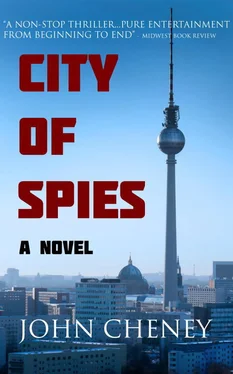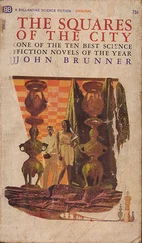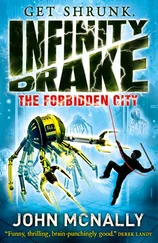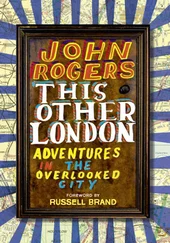“I should apologize,” Everton said. “We knew Brüske was on the move, but we had no idea where he was.”
“You couldn’t have warned me?” Jack said with some indignation.
Everton reluctantly shook his head. “I know how hard you’ve worked to put your past behind you. From our analysis, the danger wasn’t imminent. We didn’t think he could get anywhere near you. Would you prefer I have you look over your shoulder for the rest of your life?”
“Anyone who’s worked in the field always does,” Jack said.
The men contemplated those words in rueful silence.
“So,” Jack finally said, “what did you find on Brüske?”
Everton cleared his throat and began to lay it out for him. “Six months ago, one of our assets in Berlin ran into trouble with this guy who came out of the blue.”
“Brüske,” Jack said matter-of-factly.
Everton nodded and continued. “He threatened our contact while he tried to draw out information regarding our Cold War operations, stuff that was going on ten years ago. Very unusual. But stranger still, he asked about Müller.”
“What?” Jack sat forward in surprise.
“Yeah. He said he knew Müller had been secretly working in intelligence. No one knew that even after the Wall fell. At any rate, he said Müller had a contact in British intelligence, and before he died he’d told this contact where he’d hidden some files on a high-profile GDR mole.”
Jack was filled with sadness at the mention of Müller’s death. He knew Müller had been diagnosed with cancer in late 1991 and, after a short struggle, died almost a year later.
Everton continued, “Stranger still, he somehow caught wind of our operation to recover the documents—and almost took out one of agents. I guess that led him to Crandall.”
“Crandall?”
Everton nodded solemnly. “He was killed this summer. Poisoned. We’re certain this Brüske did it.”
Jack’s head was reeling with the information. “Was he working with anybody?”
Everton shook his head definitively. “No. We’re certain this guy was a lone wolf, collecting information by capturing and torturing our agents. Brüske’s going away for good. We’ve got enough to convict him of Crandall’s murder—that is if we ever decide to put him up for trial. But either way, he’ll rot in a cell for the rest of his life.”
The brutal reality of Everton’s words gave Jack some comfort, but still one question burned in his mind.
“Andrew,” Jack said, leaning forward and locking his gaze on his friend, “how safe is my family?”
Late that afternoon, Jack, Anna, and Alex were alone again. Everton and the last of the FBI agents were gone by two o’clock, returning the house to its normal solitude. But the peaceful tranquility of the place, the thing that had insulated the family from the world, had been shattered. Jack was determined to have it return. Everton had assiduously promised that his family was no longer in danger; any threat that could blow his way would be intercepted before ever coming to a head like this again. Everton knew the value his friend placed on his family, and felt obligated to protect them as best he could. Still, Jack would not be forever haunted by his past. This, more than anything else, he had to control. His ability to create his own life with his family was what defined him.
Jack and Alex sat on the deck, watching the sun set over the lake. Alex huddled tight in his father’s lap. Jack kept his strong arms wrapped around the boy in a reassuring embrace, a fatherly gesture of protection. Alex slowly relaxed, his head comfortably laying against his father’s chest. Jack looked out on the mirror-like surface of the lake, its orange and yellow reflections now mixed with the glitter of the falling sunlight. As the sun descended behind the crimson and amber forest the light illuminated the trees and reflected off the water so brilliantly that it seemed the world was on fire. Jack watched, his mind troubled. How deeply had this day’s incident traumatized his son? Brüske had spoken frightening words—had called his son’s father a traitor and murderer. In the shock of the event, Alex had only reacted to the physical danger. But sometime, inevitably, questions would arise from those words.
Time had given Jack perspective on the morality of his intelligence career. He reflected on his choices at length and thoroughly deliberated them. Now, as before, he knew he had acted justly. He knew he had acted in defense of a people, in defense of the peace, in defense of his own life. He did not know how to tell his son.
In preparing this novel, I have drawn on the work of many Cold War historians. I am especially indebted to Dr. Otto Wenzel’s article in Armor magazine which detailed the actual Operation STOSS plans. Thomas Flemming and Hagen Koch’s book The Berlin Wall: Division of a City provided key information regarding the dynamics of the Berlin Wall, the Friedrichstrasse checkpoint, ghost stations, and the nature of the border guards.
The official East German military handbooks Handbuch für den Grenzdienst , Handbuch Militärisches Grundwissen , and Vom Sinn des Soldatseins were invaluable resources, as was Thomas Forster’s The East German Army: The Second Power in the Warsaw Pact .
For technical information on spy equipment, I drew on H. Keith Melton’s Ultimate Spy . Markus Wolf’s autobiography Man Without a Face: The Autobiography of Communism’s Greatest Spymaster , John Koehler’s Stasi: The Untold Story of the East German Secret Police , and Jens Gieseke’s The GDR State Security: Shield and Sword of the Party provided insider details to the history of the Stasi.
Visits to various locations in and around Berlin were especially helpful. I must thank the Forschungs-und Gedenkstätte Normanenstrasse (the former Stasi headquarters), and the Gedenkstätte Hohenschönhausen (Hohenschönhausen Prison Memorial) for preserving these locations so current and future generations can learn from past events. In particular, I thank the former inmates of Hohenschönhausen, whose guided tours of the prison gave insight to what was experienced there.
Additionally, visits to museums such as the Haus am Checkpoint Charlie, NVA-Museum Prora, Marinemuseum Dänholm, and the Wende Museum in Los Angeles were also great sources of information.
However, this book is a work of fiction, and any errors or alterations of fact and views expressed here are solely my own.
From the moment he first set foot in Berlin, John Cheney knew he was in a city of contrasts. On one hand, Berlin is charging headlong into the future — on the other, Berlin is a city haunted by its past. John sensed there was an untold story to be mined from Berlin’s recent history, and when he learned about the Border’s Edge series of exercises that were held in the 1980s, he knew he had found it. Born and raised in Michigan, John Cheney has lived in Germany, England, and Los Angeles. He loves to travel, absorbing the culture and history of every place he encounters. John began his career in film, writing and directing several short films that have played at festivals across the United States and in Europe. City of Spies is his first novel. John’s second novel, present-day thriller The Apocalypse Men , was released in November 2015.
Follow John on Twitter: @JCheneywrites
See a virtual tour of the locations of City of Spies and more at: www.facebook.com/cityofspies
City of Spies
By John Cheney
SHURLAND PRESS
Smashwords Edition
Copyright © 2014 John Cheney
Читать дальше












